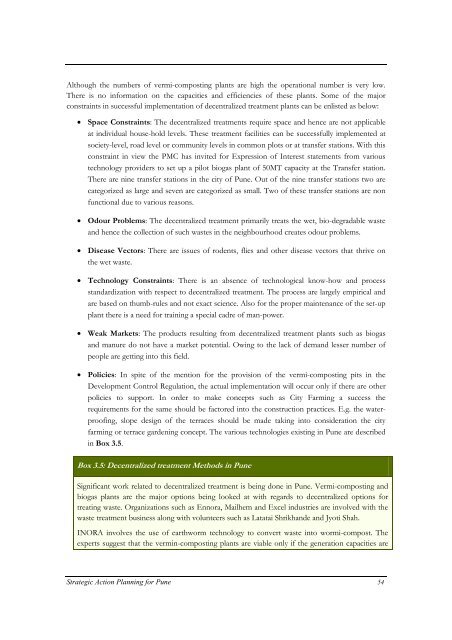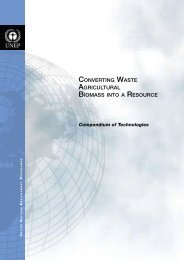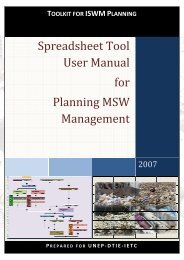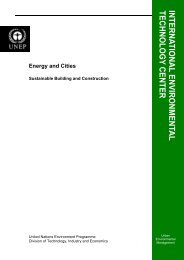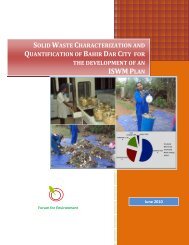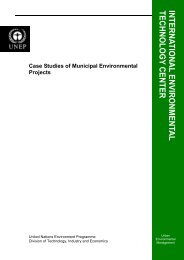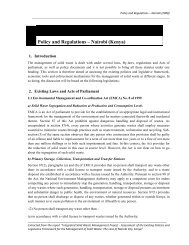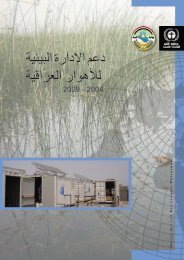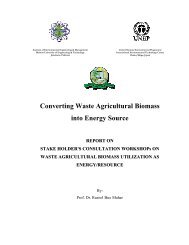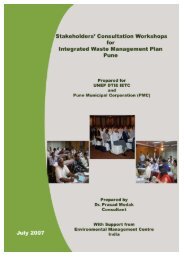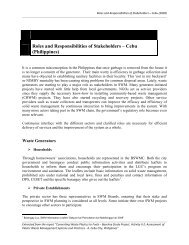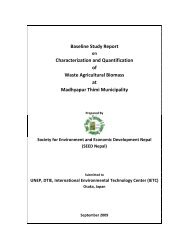Strategic Action Plan - International Environmental Technology Centre
Strategic Action Plan - International Environmental Technology Centre
Strategic Action Plan - International Environmental Technology Centre
Create successful ePaper yourself
Turn your PDF publications into a flip-book with our unique Google optimized e-Paper software.
Although the numbers of vermi-composting plants are high the operational number is very low.<br />
There is no information on the capacities and efficiencies of these plants. Some of the major<br />
constraints in successful implementation of decentralized treatment plants can be enlisted as below:<br />
• Space Constraints: The decentralized treatments require space and hence are not applicable<br />
at individual house-hold levels. These treatment facilities can be successfully implemented at<br />
society-level, road level or community levels in common plots or at transfer stations. With this<br />
constraint in view the PMC has invited for Expression of Interest statements from various<br />
technology providers to set up a pilot biogas plant of 50MT capacity at the Transfer station.<br />
There are nine transfer stations in the city of Pune. Out of the nine transfer stations two are<br />
categorized as large and seven are categorized as small. Two of these transfer stations are non<br />
functional due to various reasons.<br />
• Odour Problems: The decentralized treatment primarily treats the wet, bio-degradable waste<br />
and hence the collection of such wastes in the neighbourhood creates odour problems.<br />
• Disease Vectors: There are issues of rodents, flies and other disease vectors that thrive on<br />
the wet waste.<br />
• <strong>Technology</strong> Constraints: There is an absence of technological know-how and process<br />
standardization with respect to decentralized treatment. The process are largely empirical and<br />
are based on thumb-rules and not exact science. Also for the proper maintenance of the set-up<br />
plant there is a need for training a special cadre of man-power.<br />
• Weak Markets: The products resulting from decentralized treatment plants such as biogas<br />
and manure do not have a market potential. Owing to the lack of demand lesser number of<br />
people are getting into this field.<br />
• Policies: In spite of the mention for the provision of the vermi-composting pits in the<br />
Development Control Regulation, the actual implementation will occur only if there are other<br />
policies to support. In order to make concepts such as City Farming a success the<br />
requirements for the same should be factored into the construction practices. E.g. the waterproofing,<br />
slope design of the terraces should be made taking into consideration the city<br />
farming or terrace gardening concept. The various technologies existing in Pune are described<br />
in Box 3.5.<br />
Box 3.5: Decentralized treatment Methods in Pune<br />
Significant work related to decentralized treatment is being done in Pune. Vermi-composting and<br />
biogas plants are the major options being looked at with regards to decentralized options for<br />
treating waste. Organizations such as Ennora, Mailhem and Excel industries are involved with the<br />
waste treatment business along with volunteers such as Latatai Shrikhande and Jyoti Shah.<br />
INORA involves the use of earthworm technology to convert waste into wormi-compost. The<br />
experts suggest that the vermin-composting plants are viable only if the generation capacities are<br />
<strong>Strategic</strong> <strong>Action</strong> <strong>Plan</strong>ning for Pune 54


